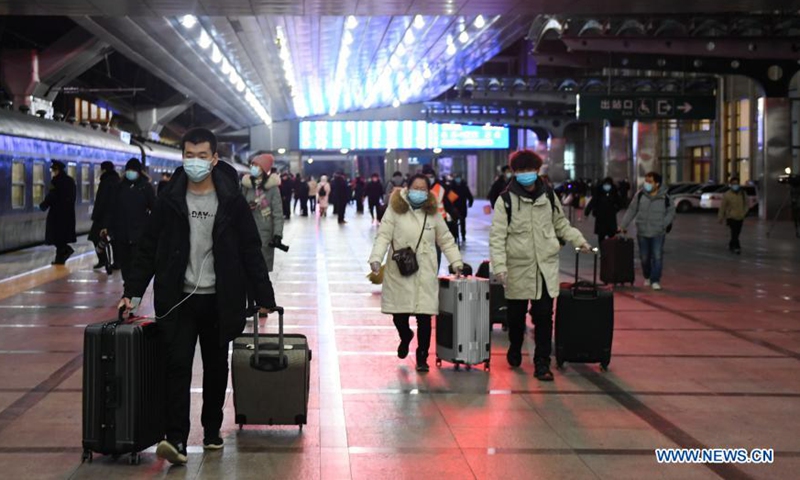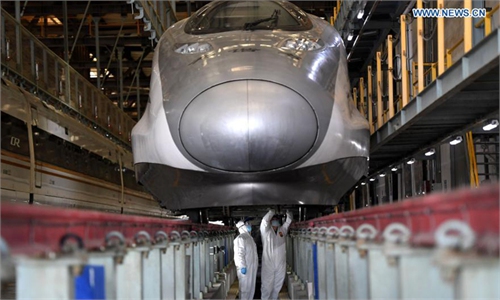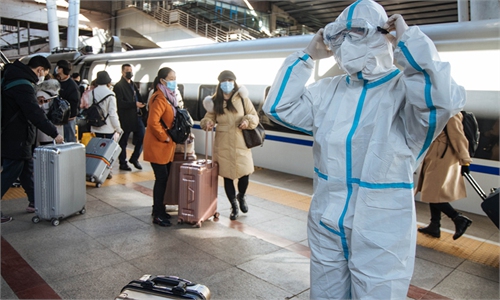BBC clueless to Chinese people's collective spirit
BBC clueless to Chinese people’s collective spirit

Passengers walk to board their train at the Beijing Railway Station, in Beijing, capital of China, Jan. 28, 2021. The Spring Festival travel rush, known as the world's largest annual human migration, lasts 40 days from Jan. 28 to March 8 this year. (Xinhua/Zhang Chenlin)
The Chinese people do not think much of Western media outlets nowadays, and the BBC may be considered one of the most unreliable among them.
On Thursday, the BBC published an article arguing that China is adopting a "carrot-and-stick" approach to stop people from going home for Spring Festival holidays, calling it a "clampdown" on China. This shows a sheer lack of understanding of Chinese people's collective spirit, even after China's practices have proved to be the most effective way to control the virus.
No Chinese person would see this appeal as "carrot and stick." They understand the travel rush, the largest annual human migration in the world, could put huge pressure on China's epidemic prevention and control, especially in winter conditions. They know well that family reunions can come later, but the risk of the virus must be controlled. This is what the BBC could not figure out and could not believe - that most Chinese people are voluntarily staying put for the holidays. If the Western media tries to hype up emotion over the issue in China, it will be disappointed.
During the Spring Festival travel season in 2020, the then-mysterious virus spread to multiple places in China due to population flows. Quite a few people were later stuck in their hometowns or tourist destinations after travel restrictions were carried out. So this year, when people are encouraged to stay where they are for the coming festival season, it is not hard to accept it. Also, this is not mandatory. People are free to go home if they want to. The government at all levels have corresponding measures to make sure the possible spread of the virus will be controlled.
The Chinese people are well aware that sacrificing their personal freedom is needed in times of a crisis. During the lockdowns, a handful of people broke the rules by going out or traveling around without authorization. They later faced condemnation from Chinese public opinion.
The attitude of Chinese people does not change when hearing the call to stay local during the coming holidays. Westerners, who adore liberalism and freedom, find it hard to digest such a mentality. This is simply because the Chinese people know better that everyone shares the responsibility for the fate of their country.
Most Chinese people are sober, and contrary to what the BBC report indicated, they won't whine about loss of personal freedom for a while as they know they are protected well by collectivism.
Take a look at Western countries. Just this month, demonstrations against epidemic control measures or orders to postpone the reopening of schools have taken place in multiple European countries. Protests for various reasons have never ceased in the US. The number of infections is surging but still they criticize China, mocking China's "authoritarianism." Liberalism does have advantages, but when it puts freedom above responsibility it's just selfish, and it allows the virus to sweep through their countries.
It is a pity that the BBC never tried to think about whether China was doing something right, and whether its measures are worth learning from. Instead it has been busy reinforcing its rhetoric that China is "cracking down" on its people, creating nothing but fake news.
Quite a few Chinese people now feel disdain for the BBC. When a BBC journalist asked a supermarket clerk in Beijing what he thought about China's recovery from COVID-19, he replied, "We are controlling it, much better than in your country." When the BBC released its news items recording the situation in Wuhan one year after the coronavirus lockdown with a biased narrative, the comments of most Chinese netizens showed their shared sentiment - what do they expect from us? To cry all day long?
The interviewees in the BBC's reports showed how confident Chinese people are today when facing condescending questions from Westerners, and how they doubt the Western media's credibility.
In its article about the Spring Festival, the BBC even hinted that Chinese tourists who expected to travel abroad have no chance this year. Nice try. An overwhelming majority of Chinese people have no plans at all for travelling abroad any time soon.
Is it too much to ask to reflect on why the UK failed to curb the virus at home? The BBC's continuous efforts to twist the truth played a role in its country's terrible epidemic response.
The world's largest human migration has started. But the majority of Chinese people are ready to give up family reunions this time. This has nothing to do with a "clampdown," but the pursuit of a longer reunion for all.
The author is a reporter with the Global Times. opinion@globaltimes.com.cn



